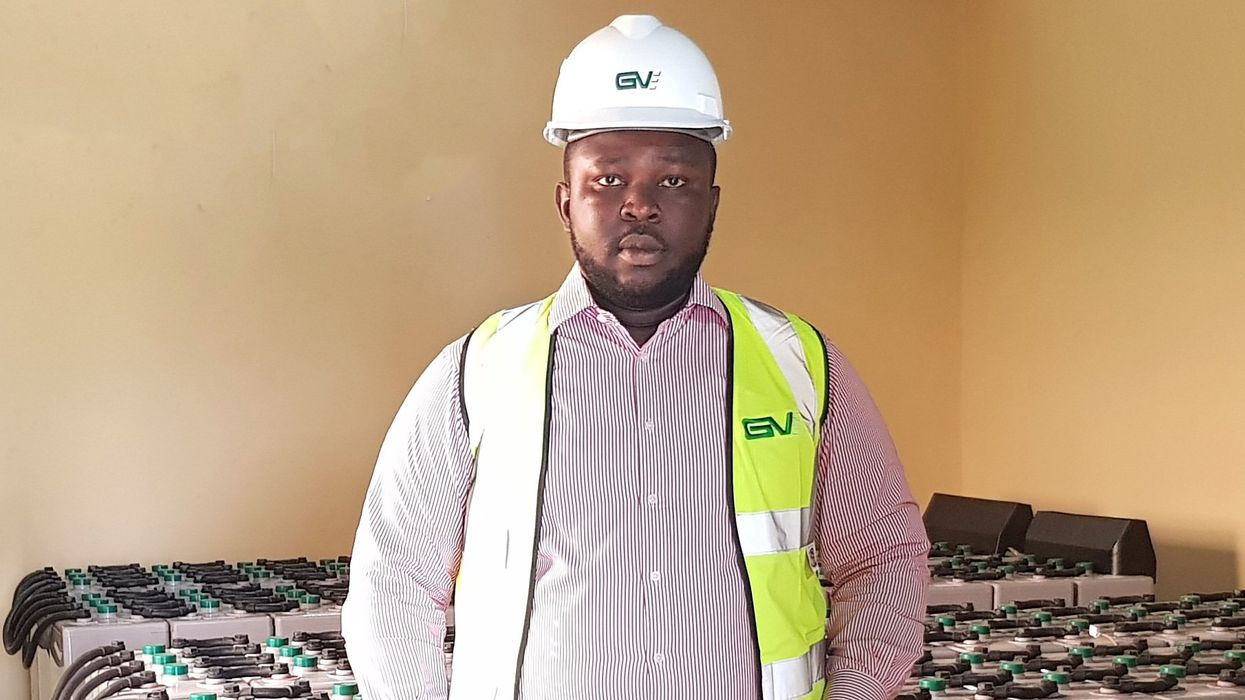

When Ifeanyi Orajaka was an undergraduate engineering student in 2008, he had his career all mapped out. After he graduated from the Federal University of Technology in Owerri, Nigeria, his plan was to get a high-paying job at one of the multinational oil and gas companies based in the country. To improve his chances, he worked as an intern for two of them.
But during one of those internships, he visited some of the oil company’s facilities in a rural area and was shocked to see that people living nearby had no access to electricity.
In 2008 only about half of Nigeria’s 152 million citizens had electricity, according to a Macrotrends report.
That incident—as well as Orajaka’s new fascination with renewable energy technologies, specifically solar—changed his career trajectory.
Ifeanyi Orajaka
Employer
Green Village Electricity Projects
Title
Chief executive
Member grade
Member
Alma maters
Federal University of Technology in Owerri, Nigeria, and University of Port Harcourt, in Choba, Nigeria
“Given the power-supply inadequacies in Nigeria,” he says, “I was keenly interested in how solar energy could help Nigeria solve some of its energy challenges.”
He began researching how solar energy technology worked. Based on what he learned, he and three classmates built a solar-powered 6-kilowatt minigrid that supplied power to about 60 homes in a village. Minigrids use distributed off-grid energy solutions that operate independently from the national transmission grid. Orajaka says his off-grid system of the first of its kind developed and implemented in Nigeria.
His team entered its “Project Spread the Light: Provide Electricity in a Small Settlement” in the 2009 IEEE Presidents’ Change the World Project Competition, which was for students who had developed solutions to real-world problems. (The competition is no longer held.) At the time, Orajaka was an IEEE student member. The minigrid received the Outstanding Student Humanitarian Prize of US $1,000.
“The support from IEEE gave us validation, and that helped us to believe in ourselves and the ideas we came up with,” Orajaka says. “They have helped ensure that millions of Nigerians now have access to quality, reliable electricity because of that initial support we got from the IEEE family.”
Winning the competition, he says, changed his life.
Expanding microgrids beyond the underserved
During their final semester in 2010, the students decided it was time to implement their idea, and they turned to IEEE once again. They put together documentation on how the minigrid worked, created a budget, and applied for a grant from the IEEE Foundation.
“I still have a very vivid memory of the moment I received the email from the IEEE Foundation notifying us that our request had been approved,” Orajaka says. “That has been one of the most phenomenal moments of my life. The Foundation provided us with $44,521. I still remember the number, down to the last dollar.”
The grant provided the seed money to launch their startup that year: Green Village Electricity Projects of Port Harcourt, Nigeria. The IEEE member is GVE’s chief executive.
GVE also has received support over the years from IEEE Smart Village, which helps entrepreneurs set up small utilities. Smart Village provides grants for the initial investment to buy equipment, as well as mentoring and training.
Today GVE is one of Nigeria’s leading renewable energy companies. It provides solutions for residential, commercial, and industrial customers as well as for unserved and underserved communities. Services include consulting on renewable energy projects, implementing smart metering and utility management systems, and installing solar-based systems at hotels, offices, and manufacturing plants.
“To a large extent, I wouldn’t be the person I am today if not for the support from the IEEE and IEEE Foundation.”
The company’s current minigrids have a total stored capacity of about 5.1 megawatts, serving more than 30,000 households and businesses. By the end of this year, Orajaka expects the total minigrid capacity to increase to about 8.3 MWs and the number of customers to double.
GVE is on a hiring spree. Orajaka says he anticipates the number of employees to increase from 68 to 90 this year.
The company supports homegrown innovation, he says, and it forms global strategic partnerships. It is working with mobility companies to provide charging stations and battery-swapping stations for e-bikes and other e-vehicles throughout the country, he says.
“We think [the collaborations] are timely, given that the Nigerian government has recently removed the agelong subsidy on petroleum products—which has increased their price by almost a factor of four,” he says. “Having these [stations] in place will help fight climate change.”
Orajaka and the other founders have set their sights higher than just providing off-grid rural areas with electricity. He says the company’s long-term strategic vision is to become the largest, most energy-efficient utility in the country.
 Members of IEEE Smart Village and those from the local community help install one of Green Village Electricity Projects’s solar-powered minigrids. Ifeanyi Orajaka
Members of IEEE Smart Village and those from the local community help install one of Green Village Electricity Projects’s solar-powered minigrids. Ifeanyi Orajaka
A recognized leader in Africa
Both Orajaka and GVE have received accolades.
In 2018 he was in the inaugural cohort of the Obama Foundation’s Leaders Africa program. Established by former U.S. president Barack Obama, the leadership program is for those from Africa, Asia-Pacific, and Europe who are working to improve public, private, and civic development through grassroots action.
The Guardian named Orajaka one of Nigeria’s 100 Most Innovative CEOs of 2019, and he was selected as the 2016 Leader of the Year by the African Energy Chamber.
The London Stock Exchange identified GVE as one of the fastest-growing private companies in Africa in 2019.
U.S. climate envoy John Kerry in September visited the Wuse market in Abuja, Nigeria, where he joined other dignitaries to celebrate that GVE had connected the market to the power grid with a 1 MW microgrid. The project received support from Power Africa and USAID.
Becoming an impact-focused business leader
Orajaka joined IEEE as a student member at Federal University because, he says, the organization’s publications widened his horizons “beyond what we were being taught in school.” He says membership helped him get insight into new technologies and topics that were of interest to those working in the electrical and electronics engineering field
“Through the presentations and technical lectures that were being delivered, I got really interested and decided to join,” he says.
While pursuing a bachelor’s degree in electrical and electronics engineering, he worked as a Shell intern in 2009. He helped maintain, repair, and test the company’s generators, motors, pumps, and other field equipment. Later that year, he got an internship at ExxonMobil, where he worked until 2010 in IT support, helping with data network projects and user assistance.
He earned a master’s degree in electrical power systems engineering in 2018 from the University of Port Harcourt, in Choba, Nigeria.
To better learn how to run a company, Orajaka has taken courses on business administration and management from the Harvard Business School Executive Education program. He is also a graduate of the Stanford University Graduate School of Business Seed program for entrepreneurs from Africa and South Asia.
Orajaka credits IEEE for much of his business success.
“To a large extent, I wouldn’t be the person I am today if not for the support from the IEEE and IEEE Foundation,” he says. “Perhaps I would have been an engineer working in either Chevron, Shell, or ExxonMobil today.
“The mentorship from the leaders and all the other members of the Foundation and the Smart Village family—I like to call them family—has helped shape me to be a business leader. And not just a business leader, an impact-focused business leader.
“IEEE helped us to become better engineers beyond what we were taught in the classroom,” he continues. “The IEEE ecosystem opened us up to support from more experienced and advanced engineers from different parts of the world who could look through our designs and provide expert guidance that have over the years helped shape our engineering design-thinking process. Smart Village, which is a combination of several professionals from different industries, helped us to be better entrepreneurs, to look beyond just the engineering aspect and learn skills required to actually build a sustainable business.”
Reference: https://ift.tt/nlMkX2T
No comments:
Post a Comment